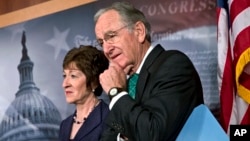CAPITOL HILL —
A bill to protect homosexual and trans-gendered Americans from workplace discrimination has cleared an initial hurdle in the U.S. Senate, and is expected to be approved in the coming days. The Employment Non-Discrimination Act, or ENDA, has President Barack Obama’s backing, but appears unlikely to come up for a vote in the Republican-led House of Representatives.
The Democratic-led Senate voted Monday to begin debate on ENDA by a vote of 61 to 30, a margin that all but assures passage in the chamber when a final vote is held.
At a time when same-sex marriage stands at the forefront of the battle over gay rights, ENDA seeks to address a different concern: the ability of gay people to work and support themselves. In a majority of U.S. states, it is not against the law for a worker to be denied a job or fired over his or her sexual orientation or gender identity.
Democratic Senator Tom Harkin said ENDA would ban such discrimination nationwide.
“Lesbian, gay, bisexual and trans-gendered [LGBT] Americans deserve the same civil rights protections from discrimination as all other Americans. This bill will accomplish that," he said. "No American should be turned away or having to fear the loss of their job or their means of support for any reasons other than their ability to do that job.”
All Democratic senators voted to advance ENDA, joined by seven Republicans, including Susan Collins of the northeastern state of Maine.
“The right to work is fundamental," she said. "How can we in good conscience deny that right to any LGBT American who is qualified and willing to work?”
No senator took the floor Monday to speak in opposition to ENDA. But despite the bill’s exemptions for religious organizations, some conservative groups have decried ENDA as an affront to people of faith and an attack on religious liberty.
In the House of Representatives, Speaker John Boehner issued a statement saying the bill will encourage frivolous lawsuits and hamper job creation. Without Boehner’s backing, it is not likely ENDA will get a vote in the House, and it is not clear the bill would pass there even if it did.
Many of America’s best-known corporations already have policies banning discrimination on the basis of sexual orientation. Polls show large majorities of Americans not only support workplace protections for gay people, but mistakenly believe such protections already exist nationwide. Current U.S. law bans discrimination on the basis of race, gender, religion and disability.
More than four dozen countries have laws protecting gays in the workplace, including many European nations, Canada, Israel and Australia.
The Democratic-led Senate voted Monday to begin debate on ENDA by a vote of 61 to 30, a margin that all but assures passage in the chamber when a final vote is held.
At a time when same-sex marriage stands at the forefront of the battle over gay rights, ENDA seeks to address a different concern: the ability of gay people to work and support themselves. In a majority of U.S. states, it is not against the law for a worker to be denied a job or fired over his or her sexual orientation or gender identity.
Democratic Senator Tom Harkin said ENDA would ban such discrimination nationwide.
“Lesbian, gay, bisexual and trans-gendered [LGBT] Americans deserve the same civil rights protections from discrimination as all other Americans. This bill will accomplish that," he said. "No American should be turned away or having to fear the loss of their job or their means of support for any reasons other than their ability to do that job.”
All Democratic senators voted to advance ENDA, joined by seven Republicans, including Susan Collins of the northeastern state of Maine.
“The right to work is fundamental," she said. "How can we in good conscience deny that right to any LGBT American who is qualified and willing to work?”
No senator took the floor Monday to speak in opposition to ENDA. But despite the bill’s exemptions for religious organizations, some conservative groups have decried ENDA as an affront to people of faith and an attack on religious liberty.
In the House of Representatives, Speaker John Boehner issued a statement saying the bill will encourage frivolous lawsuits and hamper job creation. Without Boehner’s backing, it is not likely ENDA will get a vote in the House, and it is not clear the bill would pass there even if it did.
Many of America’s best-known corporations already have policies banning discrimination on the basis of sexual orientation. Polls show large majorities of Americans not only support workplace protections for gay people, but mistakenly believe such protections already exist nationwide. Current U.S. law bans discrimination on the basis of race, gender, religion and disability.
More than four dozen countries have laws protecting gays in the workplace, including many European nations, Canada, Israel and Australia.




